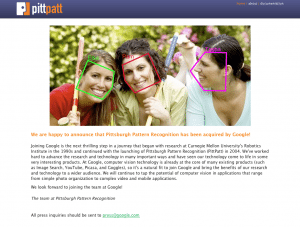First we all had to deal with finding embarrassing tagged photos of ourselves on Facebook for everybody to see, like that shot of you in a bathing suit when you were 14. PittPatt, a new application developed by researchers at Carnegie Mellon, makes all of that seem like child’s play. They have developed an app that can take a photo of a person, and through advanced facial recognition can find his identity by searching through the millions of images on Facebook, Picasa, Flickr, or Google.
Imagine that you are taking a walk through the park with your dog. A stranger approaches, snaps a shot of you. He can immediately identify you and find all of the publicly available images of you in less than a minute. It does not matter if you are wearing a mask, glasses, or a hat tilted at a roguish angle obscuring your face. PittPatt’s proprietary technology can still find your match. Even scarier—not only are you identified to total strangers, but the application scans public databases. It can take a pretty good guess at your social security number, if it can pick up your birthday from Facebook. Armed with your social security number it can get close to accessing lots of important financial data as well. YIKES!!

Is PittPatt a Pandora’s Box?
PittPatt is not available to the public yet—for now, we’ll have to wait for a hacker, or leak for this to spread. The technology that powers PittPatt was developed in the early 1990s as a reaction to 9/11. Post World Trade Center, the Defense Advanced Research Projects Agency was interested in investigating advanced spatial recognition and poured millions of dollars into R&D. So far the app has been kept under wraps, but it has just been announced that Google has purchased PittPatt in July. Google states that they do not know if, or when, they will make this application available, but they promise not to launch it unless stringent privacy protections are put in place. Given all of the recent “WikiLeaks” from supposedly secure sites, I wonder just how long before this application will be in the hands of the wrong people.
Technological advances can be wonderful if there are protections in place. It seems to me that we are facing a Pandora’s box where protection of personal privacy could be completely eliminated. Is this a box we really want to open?

The future of facial recognition online is here, now!






